Saturday, December 12, 2009
Our Blessed Lady's Saturday

From THE MYSTICAL CITY OF GOD, by Ven. Mary Agreda
It had been decreed by the immutable will of Providence that the Only-begotten of the Father should be born in the town of Bethlehem (Mich. 5, 2), and accordingly it had been foretold by the Saints and Prophets of foregone ages (Jerem. 10, 9); for the decrees of the absolute will of God are infallible, and since nothing can resist them (Esther 13, 9), sooner would heaven and earth pass away than that they fail of accomplishment (Matt. 24, 35). The fulfillment of this immutable decree the Lord secured by means of an edict of Cæsar Augustus for the whole Roman empire, ordering the registration or enumeration of all the world, as Saint Luke says (2, 1). The Roman empire at that time embraced the greater part of what was then known of the earth and therefore they called themselves masters of the world, ignoring all the other nations. The object of this census was to make all the inhabitants acknowledge themselves as vassals of the emperor, and to pay a certain tax to their temporal lord; for this registration everyone was to go to his native city in order to be inscribed. This edict was also proclaimed in Nazareth and came to the hearing of Saint Joseph while he was on some errand. He returned to his house in sorrowful consternation and informed his heavenly Spouse of the news which had spread about concerning the edict. The most prudent Virgin answered: "Let not this edict of our temporal ruler cause thee any concern, my master and spouse, for all that happens to us is ordained by the Lord and King of Heaven and earth; and in all events His Providence will assist and direct us (Eccli. 22, 28). Let us resign ourselves into His hands and we shall not be disappointed."
Most holy Mary was capable of being entrusted with all the mysteries of her most holy Son and She knew of the prophecies and their fulfillment; hence, also, that the Only-begotten of the Father and her own was to be born in Bethlehem, a Stranger and an Unknown. But She said nothing of this to Saint Joseph; for without being commissioned by the Lord She would reveal none of His secrets. All that She was not commanded to reveal She concealed with admirable prudence, notwithstanding her desire of consoling her most faithful and holy spouse. She wished to entrust Herself to his direction and arrangement without acting the part of those who are wise in their own conceit, as Wisdom warns us (Prov. 3, 7). They therefore conferred with each other about the course to be pursued; for already the pregnancy of the heavenly Lady was far advanced and her parturition was approaching. Saint Joseph said: "Queen of heaven and earth and my Mistress, if Thou hast no order to the contrary from the Almighty, it seems to me necessary that I go alone. Yet, although this order refers only to the heads of families, I dare not leave Thee without assistance, nor could I live without Thee, nor would I have a moment's peace away from Thee; for my heart could not come to any rest without seeing Thee.
They at the same time resolved upon the day of their departure, and Joseph diligently searched in the town of Nazareth for some beast of burden to bear the Mistress of the world. He could not easily find one because so many people were going to different towns in order to fulfill the requirements of the edict of the emperor. But after much anxious inquiry Saint Joseph found an unpretentious little beast which, if we can call such creatures fortunate, was the most fortunate of all the irrational animals; since it was privileged not only to bear the Queen of all creation and the blessed fruit of her womb, the King of kings and the Lord of lords, but afterwards to be present at His Birth (Isaias 1, 3); and since it gave to its Creator the homage denied to Him by men. They provided the articles for the journey, which would last five days. The outfit of the heavenly travelers was the same as that which they had provided for their previous journey to the house of Zacharias on their visit to Elisabeth. They carried with them bread, fruit and some fishes, which ordinarily composed their nourishment. As the most prudent Virgin was enlightened regarding their protracted absence, She made use of prudent concealment in taking along the linens and clothes necessary for her heavenly delivery, for She wished to dispose all things: according to the exalted intents of the Lord and in preparation for the events which She expected. Their house they left in charge of some neighbor until they should return.
The most pure Mary and the glorious Saint Joseph departed from Nazareth for Bethlehem alone, poor and humble in the eyes of the world. None of the mortals thought more of them than what was warranted by their poverty and humility. But O the wonderful sacraments of the Most High, hidden to the proud, and unpenetrated by the wisdom of the flesh! They did not walk alone, poor or despised, but prosperous, rich and in magnificence. They were most worthy of the immense love of the eternal Father and most estimable in His eyes. They carried with them the Treasure of Heaven, the Deity itself. The whole court of the celestial ministers venerated them. All the inanimate beings recognized the living and true Ark of the Testament (Josue 3, 16) more readily than the waters of the Jordan recognized its type and shadow, when they courteously laid open and free the path for its passage and for those that followed it. They were accompanied by the ten thousand Angels, which were appointed by God Himself as the servants of her Majesty during that whole journey. These heavenly squadrons marched along as their retinue in human forms visible to the heavenly Lady, more refulgent than so many suns. She herself walked in their midst better guarded and defended than the bed of Solomon, surrounded by the sixty valiant ones of Israel, girded with their swords (Cant. 3, 7). Besides these ten thousand Angels there were many others, who descended from Heaven as messengers of the eternal Father to His Only-begotten made man in His most holy Mother, and who ascended from earth as their ambassadors with messages and treaties from them to the heavenly Father.
With these wonderful favors and delights, however, the Lord joined some hardships and inconveniences, which the Divine Mother encountered on the way. For the concourse of people in the taverns, occasioned by the imperial edict, was very disagreeable and annoying to the modest and retiring Virgin-Mother and her spouse. On account of their poverty and timid retirement they were treated with less hospitality and consideration than others, especially the well-to-do; for the world judges and usually confers its favors according to outward appearance and according to personal influence. Our holy pilgrims were obliged repeatedly to listen to sharp reprimands in the taverns, at which they arrived tired out by their journey, and in some of them they were refused admittance as worthless and despicable people. Several times they assigned to the Mistress of Heaven and earth some corner of the hallway; while at others She did not fare even so well, being obliged to retire with her husband to places still more humble and unbecoming in the estimation of the world. But in whatever places She tarried, how contemptible soever it might be considered, the courtiers of Heaven established their court around their supreme King and sovereign Queen. Immediately they surrounded and enclosed them like an impenetrable wall, securing the bridal chamber of Solomon against the terrors of the night. Her most faithful spouse Joseph, seeing the Mistress of Heaven so well guarded by the Angelic hosts, betook himself to rest and sleep; for to this She urged him on account of the hardships of travel. She, however, continued her celestial colloquies with the ten thousand Angels of her retinue.
Thus variously and wonderfully assisted, our travelers arrived at the town of Bethlehem at four o'clock of the fifth day, a Saturday. As it was at the time of the winter solstice, the sun was already sinking and the night was falling. They entered the town, and wandered through many streets in search of a lodging-house or inn for staying over night. They knocked at the doors of their acquaintances and nearer family relations; but they were admitted nowhere and in many places they met with harsh words and insults. The most modest Queen followed her spouse through the crowds of people, while he went from house to house and from door to door. Although She knew that the hearts and the houses of men were to be closed to them, and although to expose her state at her age to the public gaze was more painful to her modesty than to their failure to procure a night-lodging . . . While wandering through the streets they passed the office of the public registry and they inscribed their names and paid the fiscal tribute in order to comply with the edict and not be obliged to return. They continued their search, betaking themselves to other houses. But having already applied at more than fifty different places, they found themselves rejected and sent away from them all. The heavenly Spirits were filled with astonishment at these exalted mysteries of the Most High, which manifested the patience and meekness of His Virgin Mother and the unfeeling hardness of men. At the same time they blessed the Almighty in His works and hidden sacraments, since from that day on He began to exalt and honor poverty and humility among men.
It was nine o'clock at night when the most faithful Joseph, full of bitter and heartrending sorrow, returned to his most prudent Spouse and said: "My sweetest Lady, my heart is broken with sorrow at the thought of not only not being able to shelter Thee as Thou deservest and as I desire, but in not being able to offer Thee even any kind of protection from the weather, or a place of rest, a thing rarely or never denied to the most poor and despised in the world. No doubt Heaven, in thus allowing the hearts of men to be so unmoved as to refuse us a night-lodging conceals some mystery. I now remember, Lady, that outside the city walls there is a cave, which serves as a shelter for shepherds and their flocks. Let us seek it out; perhaps it is unoccupied, and we may there expect some assistance from Heaven, since we receive none from men on earth." The most prudent Virgin answered:
"My spouse and my master, let not thy kindest heart be afflicted because the ardent wishes which the love of thy Lord excites in thee cannot be fulfilled. Since I bear Him in my womb, let us, I beseech thee, give thanks for having disposed events in this way. The place of which thou speakest shall be most satisfactory to me. Let thy tears of sorrow be turned into tears of joy, and let us lovingly embrace poverty, which is the inestimable and precious treasure of my most holy Son. He came from Heaven in order to seek it, let us then afford Him an occasion to practice it in the joy of our souls; certainly I cannot be better delighted than to see thee procure it for me. Let us go gladly wherever the Lord shall guide us."
The holy Angels accompanied the heavenly pair, brilliantly lighting up the way, and when they arrived at the city gate they saw that the cave was forsaken and unoccupied. Full of heavenly consolation, they thanked the Lord for this favor . . .
Words Of Our Blessed Lady
My dearest daughter, if thou art of a meek and docile heart, these mysteries which thou hast written about and hast understood, will stir within thee sweet sentiments of love and affection toward the Author of such great wonders. I wish that, bearing them in mind, thou from this day on embrace with new and great esteem the contempt and neglect of the world. And tell me, dearest, if, in exchange for this forgetfulness and scorn of the world, God look upon thee with eyes of sweetest love, why shouldst thou not buy so cheaply what is worth an infinite price? What can the world give thee, even when it esteems thee and exalts thee most? And what dost thou lose, if thou despise it? Is its favor not all vanity and deceit (Ps. 4, 3)? Is it not all a fleeting and momentary shadow, which eludes the grasp of those that haste after it? Hence, if thou hadst all worldly advantage in thy possession, what great feat would it be to despise it as of no value? Consider how little thou dost in rejecting all of it for the love of God, for mine and that of the holy Angels. And if the world does not neglect thee as much as thou shouldst desire, do thou on thy own behalf despise it, in order to remain free and unhampered to enjoy to the full extent the highest Good with the plenitude of His most delightful love and intercourse.
My most holy Son is such a faithful Lover of souls that He hast set me as the teacher and living example of the love of humility and true contempt of worldly vanity and pride. He ordained also for His Own glory as well as for my sake that I, His Servant and Mother, should be left without shelter and be turned away by mortals, in order that afterwards His beloved souls might be so much the more readily induced to offer Him a welcome, thus obliging Him, by an artifice of love, to come and remain with them. He also sought destitution and poverty, not because He had any need of them for bringing the practice of virtues to the highest perfection, but in order to teach mortals the shortest and surest way for reaching the heights of Divine love and union with God.
Thou knowest well, my dearest, that thou hast been incessantly instructed and exhorted by Divine enlightenment to forget the terrestrial and visible and to gird thyself with fortitude (Prov. 31, 17), to raise thyself to the imitation of me, copying in thyself, according to thy capacity, the works and virtues manifested to thee in my life. This is the very first purpose of the knowledge which thou receivest in writing this history; for thou hast in me a perfect model, and by it thou canst arrange the converse and conduct of thy life in the same manner as I arranged mine in imitation of my sweetest Son. The dread with which this command to imitate me has inspired thee as a being above thy strength, thou must moderate and thou must encourage thyself by the words of my most holy Son in the Gospel of Saint Matthew: "Be ye perfect as My heavenly Father is perfect" (5, 8). This command of the Most High imposed upon His holy Church is not impossible of fulfillment, and, if His faithful children on their part dispose themselves properly, He will deny to none of them the grace of attaining His resemblance to the heavenly Father. All this my most holy Son has merited for them. But the degrading forgetfulness and neglect of men hinder them from maturing within themselves the fruits of His Redemption.
Of thee particularly I expect this perfection, and I invite thee to it by the sweet law of love which accompanies my instruction. Ponder and scrutinize, by the Divine light, the obligation under which I place thee, and labor to correspond with it like a faithful and anxious child. Let no difficulty or hardship disturb thee, nor deter thee from any virtuous exercise, no matter how hard it may be. Nor be content with striving after the love of God and salvation of thyself alone; if thou wouldst be perfect in imitating me and fulfilling all that the Gospel teaches, thou must work for the salvation of other souls and the exaltation of the holy name of my Son, making thyself an instrument in His powerful hands for the accomplishment of mighty works to advance His pleasure and glory.
Labels: Our Blessed Lady
Friday, December 11, 2009
Friday At the Foot Of the Cross

Mary and Christ Prayer
Mary the dawn, Christ the glorious day;
Mary the gate, Christ the heavenly way.
Mary the root, Christ the holy vine;
Mary the grape, Christ the sacred wine.
Mary the wheat, Christ the living bread;
Mary the stem, Christ the rose blood-red.
Mary the font, Christ the healing flood;
Mary the chalice, Christ the saving Blood.
Mary the temple, Christ the temple's Lord;
Mary the shrine, Christ the God adored.
Mary the beacon, Christ the haven's rest;
Mary the mirror, Christ the vision blest.
Mary the Mother, Christ the Mother's Son;
Glory and praise while endless ages run.
Labels: Friday At the Foot Of the Cross
Thursday, December 10, 2009
Mike Lowell Traded?
I don't think this proposed deal is a good one. We are giving up an established clubhouse leader and very good hitter for another back-up catcher (we already have V-Mart and Varitek).
Theo, John, Larry: Cough up the dough and make the commitment to resign Jason Bay. Make Lowell the back-up 3B/DH. Halladay. Halladay. Halladay.
Theo, John, Larry: Cough up the dough and make the commitment to resign Jason Bay. Make Lowell the back-up 3B/DH. Halladay. Halladay. Halladay.
Labels: Boston Red Sox
Rorate Caeli
Drop down dew, ye heavens, from above, and let the clouds rain the Just One.
Be not angry, O Lord, and remember no longer our iniquity : behold the city of thy sanctuary is become a desert, Sion is made a desert. Jerusalem is desolate, the house of our holiness and of thy glory, where our fathers praised thee.
Drop down dew, ye heavens, from above, and let the clouds rain the Just One.
We have sinned, and we are become as one unclean, and we have all fallen as a leaf; and our iniquities, like the wind, have taken us away thou hast hid thy face from us, and hast crushed us by the hand of our iniquity.
Drop down dew, ye heavens, from above, and let the clouds rain the Just One.
See, O Lord, the affliction of thy people, and send him whom thou hast promised to send. Send forth the Lamb, the ruler of the earth, from the rock of the desert to the mount of the daughter of Sion, that he himself may take off the yoke of our captivity.
Drop down dew, ye heavens, from above, and let the clouds rain the Just One.
Be comforted, be comforted, my people; thy salvation shall speedily come why wilt thou waste away in sadness? why bath sorrow seized thee? I will save thee; fear not: for I am the Lord thy God, the Holy One of Israel, thy Redeemer.
Drop down dew, ye heavens, from above, and let the clouds rain the Just One. Rorate caeli desuper, et nubes pluant iustum.
--------------------------------------------------------------------------------
Ne irascaris Domine, ne ultra memineris iniquitatis: ecce civitas Sancti facta est deserta, Sion deserta facta est: Ierusalem desolata est: domus sanctificationis tuac et gloriae tuae, ubi laudaverunt te patres nostri.
Rorate caeli desuper, et nubes pluant iustum.
Peccavimus, et facti sumus tamquam immundus nos, et cecidimus quasi folium universi; et iniquitates nostrae quasi ventus abstulerunt nos: abscondisti faciem tuam a nobis, et allisisti nos in manu iniquitatis nostrae.
Rorate caeli desuper, et nubes pluant iustum.
Vide, Domini, afflictionem populi tui, et mitte quem missurus es, emitte Agnum dominatorem terrae, de Petra deserti montem filiae Sion: ut auferat ipse iugum captivatis nostrae.
Rorate caeli desuper, et nubes pluant iustum.
Consolamini, consolamini, popule meus: cito veniet salus tua:. quare moerore consumeris, quia innovavit te dolor? Salvabo te, noli timere: ego enim sum Dominus Deus, tuus, Sanctus Israel, Redemptor tuus.
Rorate caeli desuper, et nubes pluant iustum.
From Godzdogz:
Be not angry, O Lord, and remember no longer our iniquity : behold the city of thy sanctuary is become a desert, Sion is made a desert. Jerusalem is desolate, the house of our holiness and of thy glory, where our fathers praised thee.
Drop down dew, ye heavens, from above, and let the clouds rain the Just One.
We have sinned, and we are become as one unclean, and we have all fallen as a leaf; and our iniquities, like the wind, have taken us away thou hast hid thy face from us, and hast crushed us by the hand of our iniquity.
Drop down dew, ye heavens, from above, and let the clouds rain the Just One.
See, O Lord, the affliction of thy people, and send him whom thou hast promised to send. Send forth the Lamb, the ruler of the earth, from the rock of the desert to the mount of the daughter of Sion, that he himself may take off the yoke of our captivity.
Drop down dew, ye heavens, from above, and let the clouds rain the Just One.
Be comforted, be comforted, my people; thy salvation shall speedily come why wilt thou waste away in sadness? why bath sorrow seized thee? I will save thee; fear not: for I am the Lord thy God, the Holy One of Israel, thy Redeemer.
Drop down dew, ye heavens, from above, and let the clouds rain the Just One. Rorate caeli desuper, et nubes pluant iustum.
--------------------------------------------------------------------------------
Ne irascaris Domine, ne ultra memineris iniquitatis: ecce civitas Sancti facta est deserta, Sion deserta facta est: Ierusalem desolata est: domus sanctificationis tuac et gloriae tuae, ubi laudaverunt te patres nostri.
Rorate caeli desuper, et nubes pluant iustum.
Peccavimus, et facti sumus tamquam immundus nos, et cecidimus quasi folium universi; et iniquitates nostrae quasi ventus abstulerunt nos: abscondisti faciem tuam a nobis, et allisisti nos in manu iniquitatis nostrae.
Rorate caeli desuper, et nubes pluant iustum.
Vide, Domini, afflictionem populi tui, et mitte quem missurus es, emitte Agnum dominatorem terrae, de Petra deserti montem filiae Sion: ut auferat ipse iugum captivatis nostrae.
Rorate caeli desuper, et nubes pluant iustum.
Consolamini, consolamini, popule meus: cito veniet salus tua:. quare moerore consumeris, quia innovavit te dolor? Salvabo te, noli timere: ego enim sum Dominus Deus, tuus, Sanctus Israel, Redemptor tuus.
Rorate caeli desuper, et nubes pluant iustum.
From Godzdogz:
Labels: Advent
Tuesday, December 08, 2009
The Immaculate Conception Of Our Blessed Lady
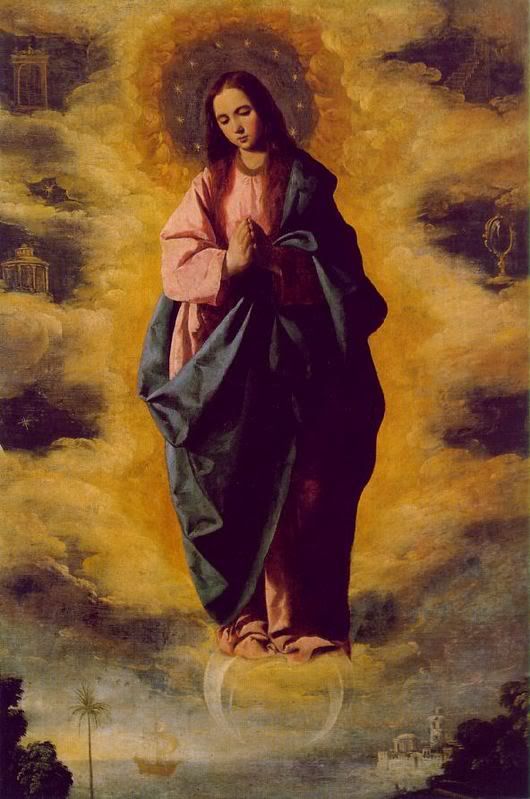
Today is one of the principal feasts of Our Blessed Lady, and a Holy Day of Obligation
From Dom Prosper Gueranger's The Liturgical Year.
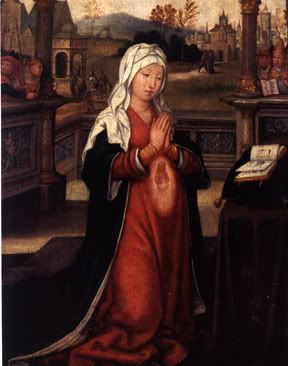
Prayer For the Immaculate Conception by Pope Pius XII
Enraptured by the splendor of thy heavenly beauty, and impelled by the anxieties of the world, we cast ourselves into thine arms, O Immacuate Mother of Jesus and our Mother, Mary, confident of finding in thy most loving heart appeasement of our ardent desires, and a safe harbor from the tempests which beset us on every side.
Though degraded by our faults and overwhelmed by infinite misery, we admire and praise the peerless richness of sublime gifts with which God has filled thee, above every other mere creature, from the first moment of thy conception until the day on which, after thine assumption into Heaven, He crowned thee Queen of the Universe.
O crystal fountain of faith, bathe our minds with the eternal truths! O fragrant Lily of all holiness, captivate our hearts with thy heavenly perfume! O Conqueress of evil and death, inspire in us a deep horror of sin, which makes the soul detestable to God and a slave of Hell!
O well-beloved of God, hear the ardent cry which rises up from every heart. Bend tenderly over our aching wounds. Convert the wicked, dry the tears of the afflicted and oppressed, comfort the poor and humble, quench hatreds, sweeten harshness, safeguard the flower of purity in youth, protect the holy Church, make all men feel the attraction of Christian goodness. In thy name, resounding harmoniously in Heaven, may they recognize that they are brothers, and that the nations are members of one family, upon which may there shine forth the sun of a universal and sincere peace.
Receive, O most sweet Mother, our humble supplications, and above all obtain for us that, one day, happy with thee, we may repeat before thy throne that hymn which today is sung on earth around thine altars: Thou art all-beautiful, O Mary! Thou art the glory, thou art the joy, thou art the honor of our people!
Amen.
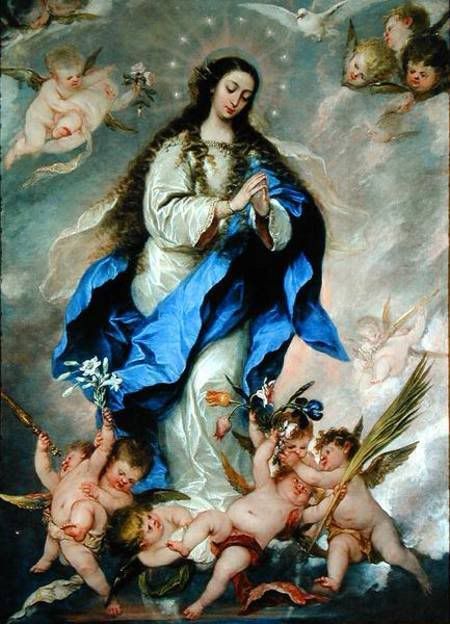
From Saint Alphonsus Liguori's The Glories of Mary
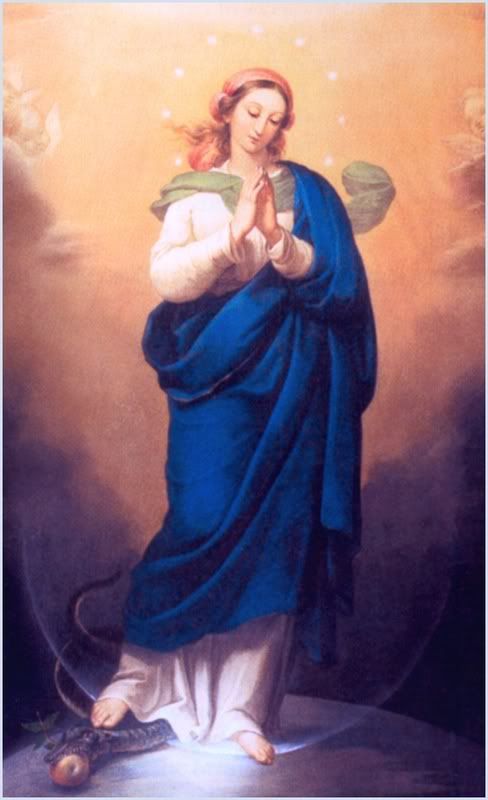
Saint Maximilian Kolbe on the dogma of the Immaculate Conception
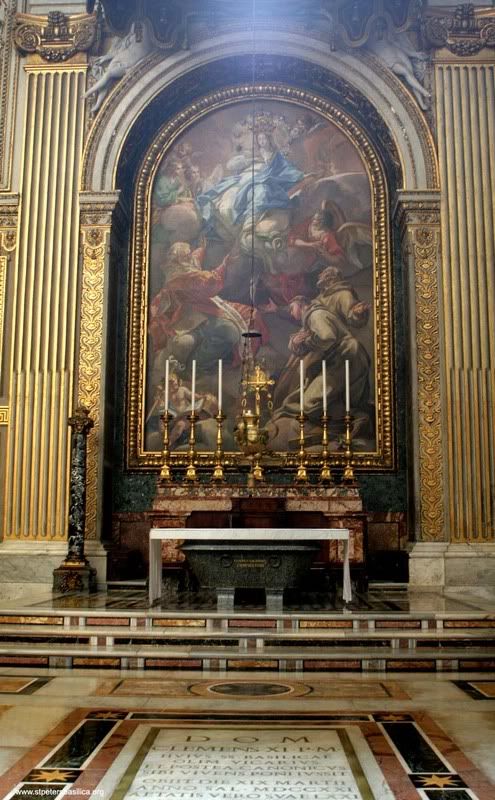
Novena For the Immaculate Conception, Day 8
Invocation (to be Said Every Day of the Novena):
Thou art all fair, O Mary,
The Original Stain is not in thee.
Thou art the glory of Jerusalem,
Thou, the joy of Israel,
Thou, the great honor of our people
Thou, the advocate of sinners.
O Mary,
O Mary,
Virgin most prudent,
Mother most merciful,
Pray for us,
Intercede for us with our Lord Jesus Christ.
O Mary, Mother of God and Mother of us, thou who by a singular privilege, in virtue of the foreseen death of our Redeemer, wast redeemed from the first moment of thy conception and preserved immune from every spot of Original Sin, we firmly believe in this thy privilege and we proclaim it aloud, saying: "Thou art all fair, O Mary, and in thee there is no stain"; thou art the Immaculate; thy raiment is white as snow; thy face shines like the sun; in thee we marvel at the brightness of eternal light and the spotless mirror of Divine beauty. Like the Divine Redeemer, thou art wholly and utterly fair, for in Him there can be no stain and thou art His most perfect reflection.
We all rejoice in the Lord, as we celebrate the feast that recalls this singular privilege of thine, O Mary, Mother of God and our Mother, and we unite ourselves to thee in magnifying and thanking Our Lord, Who through thee hath done such wondrous deeds, and hath given us in thee good cause for rejoicing.
We would be ever worthy to love thee and to sing thy glories, O Mary, our Immaculate Mother, but we are by nature sons of wrath, and only by grace can we become thy children
and acceptable unto thee. From thee we hope for assistance in obtaining the pardon of our sins, the strength to overcome our wicked passions, and to escape the snares. laid for us by the world and the devil. Wherefore, O Immaculate Mother, Mary, inspire in us an intense hatred of sin, perfect contrition for the sins we have committed, and a lively fear of falling again into sin; make our hearts and our bodies immaculate, lest we be confounded forever; and so, being cleansed of sin, with our passions under control, and the enemies of our salvation overcome, with pure hearts burning with love of thee, may we be able to sing to thee with unfaltering voices: "Thou art all fair, O Mary, and in thee there is no Original Stain; thou art our glory, thou art our joy."
Glorious things are spoken of thee, O Mary; for He that is mighty hath done great things unto thee.
Hail Mary...
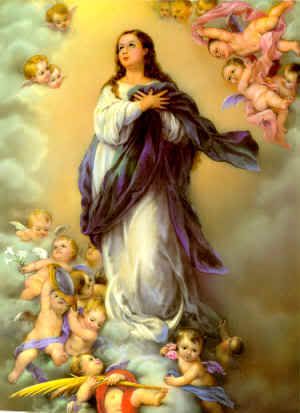
Novena For the Immaculate Conception, Day 9
Invocation (to be Said Every Day of the Novena):
Thou art all fair, O Mary,
The Original Stain is not in thee.
Thou art the glory of Jerusalem,
Thou, the joy of Israel,
Thou, the great honor of our people
Thou, the advocate of sinners.
O Mary,
O Mary,
Virgin most prudent,
Mother most merciful,
Pray for us,
Intercede for us with our Lord Jesus Christ.
Salutation of Saint Francis to the Virgin Mary
Hail, holy Lady, most holy Queen! Mother of God, Mary ever-Virgin! Chosen by the most holy Father of Heaven, and by Him, with His most holy and beloved Son and the Spirit Paraclete, consecrated! Thou in whom was and is all the fullness of grace and of goodness! Hail, thou, His palace! Hail, thou, His tabernacle! Hail, thou, His home! Hail, thou, His vesture! Hail, thou, His handmaid! Hail, thou, His Mother! And hail, too, all ye holy virtues which, by the grace and light of the Holy Ghost, are poured into the hearts of the faithful, to make them from faithless ones, faithful children of God.
Consecration to Our Blessed Mother
My Queen, my Mother! I give myself entirely to thee, and to show my devotion to thee I consecrate to thee this day, my eyes, my ears, my mouth, my heart, my whole being without reserve, Wherefore, good Mother, as I am thine own, keep me, guard me, as thy property and possession.
Amen.
O God, Who by the Immaculate Conception of the Virgin didst prepare a worthy dwelling place for Thy Son, we entreat Thee, Who didst preserve Her from all stain of sin by the Death of that same Son, foreseen by Thee, to grant that through Her intercession, we also may be made clean, and so may come to Thee, through the same Christ Our Lord.
Amen.
Hail Mary...
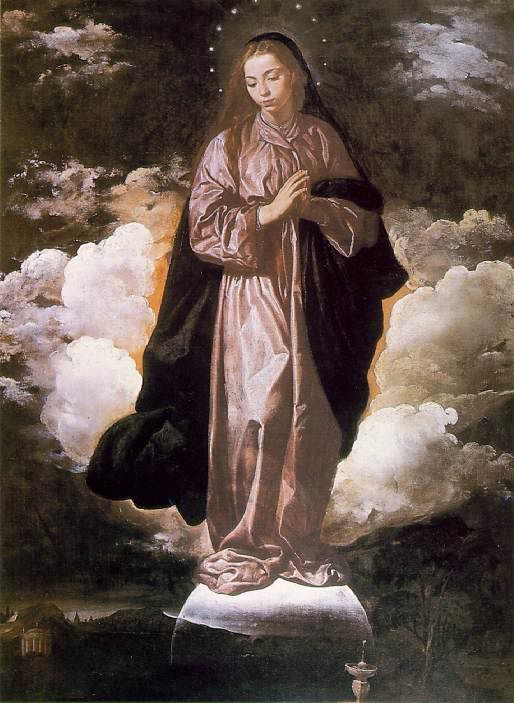
Labels: Our Blessed Lady
Monday, December 07, 2009
Pearl Harbor Anniversary
Saint Ambrose
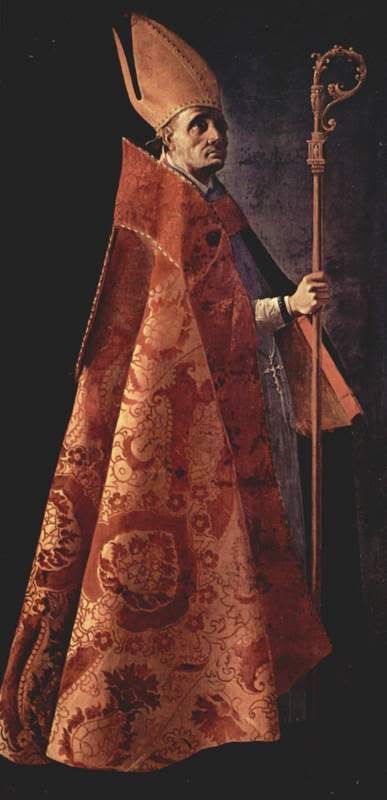
The Catholic Encyclopedia
The Golden Legend
This prayer of his is a weekly part of my prayer life, as I pray it before Mass, even though I only communicate sacramentally 2-3 times per year.
Saint Ambrose's Prayer Before the Most Blessed Sacrament
O loving Lord Jesus Christ, I a sinner, presuming not on my own merits, but trusting in Thy mercy and goodness, with fear and trembling approach the table of Thy most sacred banquet. For I have defiled both my heart and body with many sins, and have not kept a strict guard over my mind and my tongue. Wherefore, O gracious God, O awful Majesty, I, awretched creature, entangled in difficulties, have recourse to Thee the fount of mercy; to Thee do I fly that I may be healed, and take refuge under Thy protection, and I ardently desire to have Him as my Saviour, whom I am unable to face as my Judge.
To Thee, O Lord, I show my wounds, to Thee I lay bare my shame. I know that my sins are many and great, on account of which I am filled with fear. But I trust in Thy mercy, of which there is no end. Look down upon me, therefore, with the eyes of Thy mercy, O Lord Jesus Christ, eternal King, God and Man, crucified for men. Hearken unto me, for my hope is in Thee; have mercy on me, who am full of misery and sin, Thou who wilt never cease to let flow the fountain of mercy.
Hail, Victim of Salvation, offered for me and for all mankind on the gibbet of the cross! Hail, Noble and Most Precious Blood, flowing from the wounds of my crucified Lord Jesus Christ and washing away all the sins of the whole world! Remember, O Lord, Thy creature, whom Thou hast redeemed by Thy Most Precious Blood.
I am grieved because I have sinned. I desire to make amends for what I have done. Take away from me therefore, O most merciful Father, all my iniquities and sins, that, being purified both in soul and body, I may worthily partake of the Holy of Holies. Grant that my reception of Thy Body and Blood, which I purpose, unworthy though I am, may bring to me pardon for my sins, the perfect cleansing of my faults, the expulsion of all evil thoughts, and the renewal of pure feelings, the health and efficacy of good works, pleasing unto Thee, and a most strong protection both in soul and body against the snares of my enemies.
Amen.
Labels: Our Saintly Brethern
Sunday, December 06, 2009
If Today Were Not A Sunday
It would be observed liturgically as the feast of probably the most popular saint in Christendom, the patron of children, young people, poor people, prisoners, thieves, murderers, pawnbrokers, and those seeking marriage, Saint Nicholas of Myra.
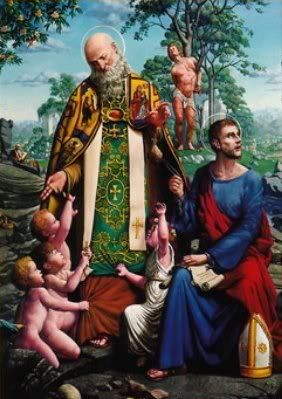
This is what The Golden Legend has to say about him.
The Saint Nicholas Center is your go-to resource on Good Saint Nicholas.
Wilson's Almanac also has a great deal of good material.
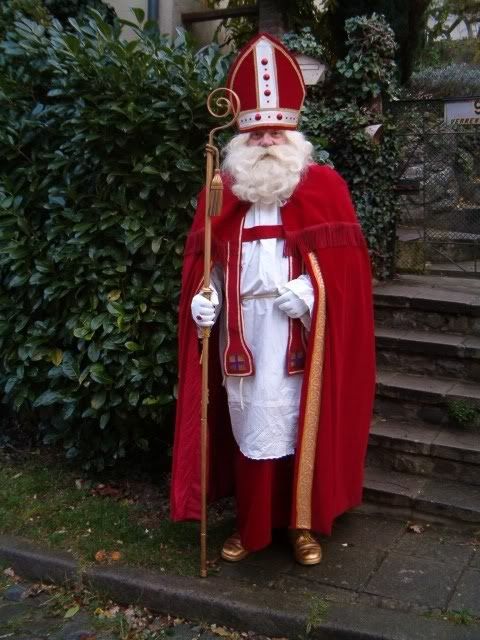
On the surface, the modern Dutch Sinterclaas looks more like the original bishop of Myra. That despite the fact that the Dutch are perhaps the most post-Christian culture in Europe.
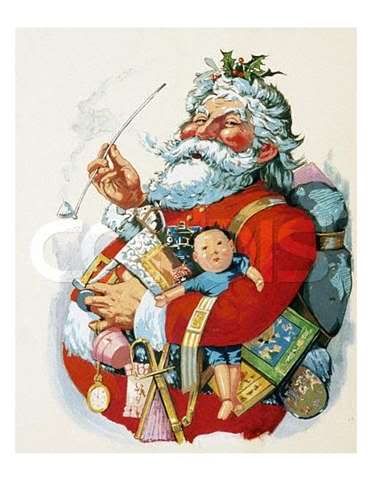
Thomas Nast's 19th century American rendition.

Twentieth Century American artist Haddon Sundblom, working for the Coca Cola Company, helped establish the modern image of Saint Nicholas, or Santa Claus.
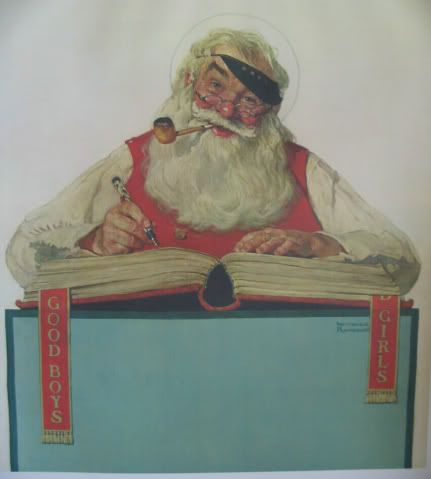
As did Norman Rockwell, working mostly for the Saturday Evening Post.
Efforts are made from time to time to update Saint Nicholas' garb and image, but they are rejected by children themselves. Ironically, the young are the ones who insist that Santa looks like this, and nothing else. You can put black boots on him, rather than brown (but they have to be the same style). You can put a strip of white fur down the front of his coat. Sometimes he can wear a harness with sleigh bells. And you can give him green mittens. But changes beyond that are rejected by children out of hand as unbecoming to Jolly Old Saint Nicholas.
Maybe Nast's/Sundblom's/Rockwell's vision has so much staying power because it is anchored in tradition. The red and white coat is an adaptation of a bishop's robes. The miter has become a fur hat.
Happy Saint Nicholas' Day!
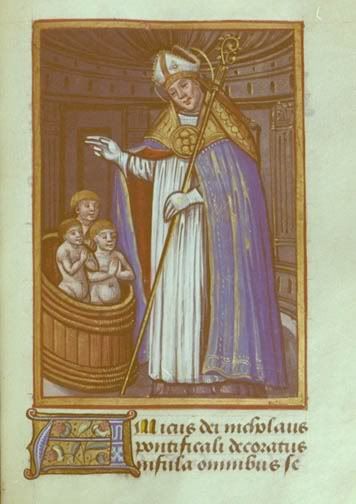
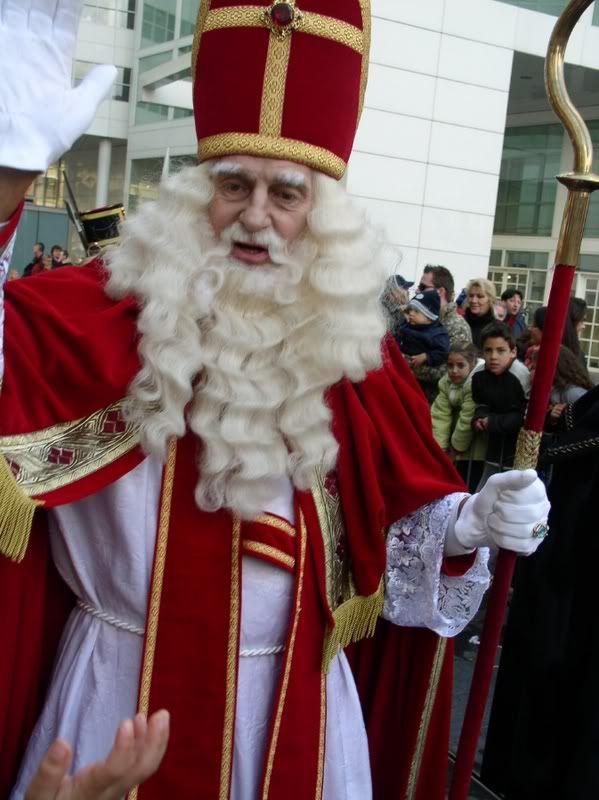
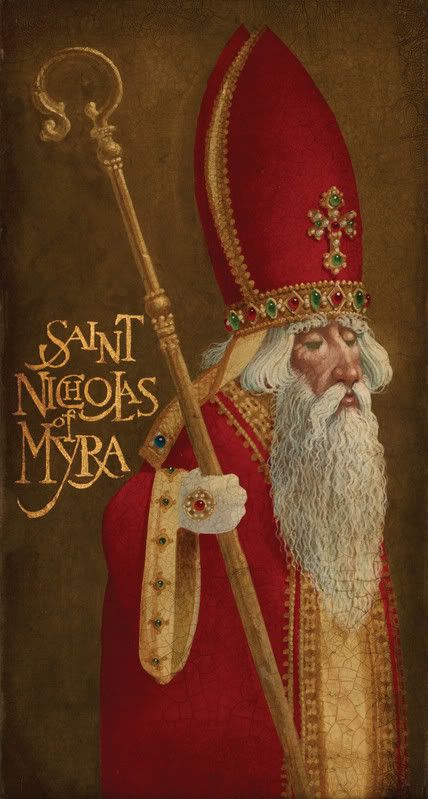
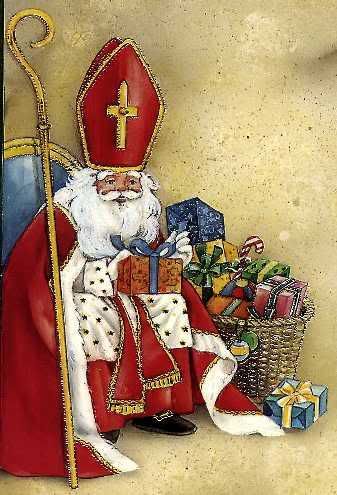
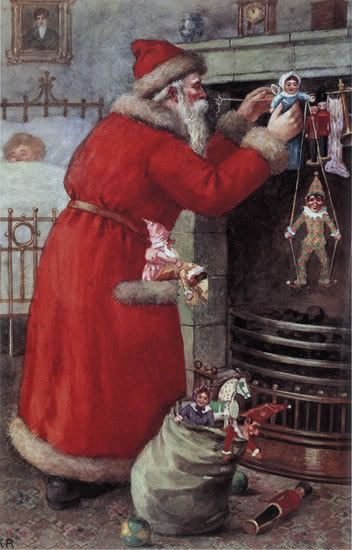

Saint Nicholas, pray for us!

This is what The Golden Legend has to say about him.
The Saint Nicholas Center is your go-to resource on Good Saint Nicholas.
Wilson's Almanac also has a great deal of good material.

On the surface, the modern Dutch Sinterclaas looks more like the original bishop of Myra. That despite the fact that the Dutch are perhaps the most post-Christian culture in Europe.

Thomas Nast's 19th century American rendition.

Twentieth Century American artist Haddon Sundblom, working for the Coca Cola Company, helped establish the modern image of Saint Nicholas, or Santa Claus.

As did Norman Rockwell, working mostly for the Saturday Evening Post.
Efforts are made from time to time to update Saint Nicholas' garb and image, but they are rejected by children themselves. Ironically, the young are the ones who insist that Santa looks like this, and nothing else. You can put black boots on him, rather than brown (but they have to be the same style). You can put a strip of white fur down the front of his coat. Sometimes he can wear a harness with sleigh bells. And you can give him green mittens. But changes beyond that are rejected by children out of hand as unbecoming to Jolly Old Saint Nicholas.
Maybe Nast's/Sundblom's/Rockwell's vision has so much staying power because it is anchored in tradition. The red and white coat is an adaptation of a bishop's robes. The miter has become a fur hat.
Happy Saint Nicholas' Day!






Saint Nicholas, pray for us!
Labels: Our Saintly Brethern
The Second Sunday Of Advent

From THE LITURGICAL YEAR, by Abbot Prosper Guéranger, OSB
THE Office of this Sunday is filled, from beginning to end, with the sentiments of hope and joy, with which the soul should be animated at the glad tidings of the speedy coming of Him Who is her Saviour and Spouse. The interior coming, that which is effected in the soul, is the almost exclusive object of the Church's prayers for this day: let us therefore open our hearts, let us prepare our lamps, and await in gladness that cry, which will be heard in the midnight: 'Glory be to God! Peace unto men!'
The Roman Church makes the Station today in the basilica of Holy-Cross-in-Jerusalem. It was in this venerable church that Constantine deposited a large piece of the true Cross, together with the title which was fastened to it by Pilate's order, and which proclaimed the kingly character of the Saviour of the world. These precious relics are still kept there; and, thus enriched with such a treasure, the basilica of Holy-Cross-in-Jerusalem is looked upon, in the Roman liturgy, as Jerusalem itself, as is evident from the allusions made in the several Masses of the Stations held in that basilica. In the language of the sacred Scriptures and of the Church, Jerusalem is the image of the faithful soul; and the Office and Mass of this Sunday have been drawn up on this idea, as the one of the day. We regret not to be able here to develop the sublime beauty of this figure; and must proceed at once to the passage, which the Church has selected from the prophet Isaias. There she tells her children how well founded are her hopes in the merciful and peaceful reign of the Messias. But first let us adore this Divine Messias:
Come, let us adore the King, our Lord, Who is to come.
From the Prophet Isaias.
Ch. xi.
And there shall come forth a branch out of the rod of Jesse, and a flower shall rise up out of his root. And the Spirit of the Lord shall rest upon Him, the Spirit of wisdom and of understanding, the Spirit of counsel and of fortitude, the Spirit of knowledge and of godliness: and h He shall be filled with the Spirit of the fear of the Lord. He shall not judge according to the sight of the eyes, nor reprove according to the hearing of the ears: but He shall judge the poor with justice, and shall reprove with equity for the meek of the earth.
And He shall strike the earth with the rod of His mouth, and with the breath of His lips He shall slay the wicked. And justice shall be the girdle of His loin, and faith the girdle of His reins. The wolf shall dwell with the lamb, and the leopard shall lie down with the kid: the calf and the lion and the sheep shall abide together, and a little child shall lead them. The calf and the bear shall feed: their young ones shall rest together: and the lion shall eat straw like an ox. And the suckling child shall play on the hole of the asp: and the weaned child shall thrust his hand into the den of the basilisk. They shall not hurt, nor shall they kill in all My holy mountain: for the earth is filled with the knowledge of the Lord, as the covering waters of the sea. In that day the root of Jesse, who standeth for an ensign of people, Him the Gentiles shall beseech, and His sepulchre shall be glorious.
How much is contained in these magnificent words of the prophet! The branch; the flower that is to come from it; the Spirit which rests on this flower; the seven gifts of this Spirit; peace and confidence established on the earth; and, throughout the world, one brotherhood in the kingdom of the Messias! St. Jerome, whose words are read by the Church in the lessons of the second nocturne of this Sunday, says that the branch which calleth forth from the root of Jesse, is the blessed Virgin Mary, who had contact with no shrub or plant; and that the flower is the Lord Jesus, Who says in the Canticle of canticles: 'I am the flower of the field, and the lily of the valley.' In every age of the Christian Church, this wonderful branch and its Divine flower have been objects of enthusiastic veneration. In the middle ages the tree of Jesse, with its prophetic branches, was carved on the cathedral porches, was painted on the windows, was embroidered on the hangings of the sanctuary, and the melodious voice of the priests sang its praises in the beautiful responsory composed by Fulbert of Chartres, and put to music by the devout king Robert.
R. The root of Jesse gave out a branch, and the branch a flower; and on the flower resteth the holy Spirit.
V. The Virgin Mother of God is the branch, her Son the flower. And on the flower resteth the Holy Spirit.
The devout St. Bernard, commenting upon this responsory in his second Advent homily, says: 'The Virgin's Son is the flower, a flower white and ruddy, chosen out of thousands; a flower on Whom the Angels love to look; a flower whose fragrance restores the dead; a flower, as Himself assures us, of the field, not of a garden: for the flowers of the field bloom without man's care, no man has sown their seed, no man has cultivated them. Just so the Virgin's womb, a meadow verdant in an endless spring, has brought forth a flower, Whose beauty will never droop, Whose freshness will never fade. O Virgin, branch sublime, to what a height art thou grown! Even up to Him that sitteth on the throne, even to the Lord of majesty. It was sure to be so, for thou castest deep down the roots of humility. O plant of Heaven indeed! precious above all, holier than all. O tree of life indeed! alone worthy to bear the fruit of salvation.'
And of the holy Spirit and His gifts, what shall we say? They rest and are poured out on the Messias only to the end that they may flow from Him upon us ; He needs them not; but we alone need wisdom and understanding, counsel and fortitude, knowledge and godliness, and fear of the Lord. Let us ask with instance for this Divine Spirit, by Whose operation Jesus was conceived and born in Mary's womb, and let us beg of Him to form Jesus within our hearts. But let us not forget to rejoice at those other glorious things which are told us by the prophet, of the happiness, and peace, and delights, which are to be on the holy mountain. The world has been looking so many ages for peace; it is now coming. Sin had caused enmity and division everywhere; grace will bring unity. A little Child will be the pledge of an alliance between all nations. The prophets have foretold it . . . a new race is being sent down to earth from high Heaven. The flock shall no more fear the fierce lions. The serpent shall be no more: the treacherous plant, which yielded poison, shall grow no more.
Come then, O Messias, and restore to the world its primitive peace; but remember, we beseech Thee, that it is in the heart of man that harmony has been broken more than elsewhere in Thy creation: cure this heart, enter into possession of this Jerusalem, which Thou lovest, though so unworthy: she has been too long captive in Babylon; lead her out of this strange land. Build up her temple again, and make the glory of this second temple to be greater than that of the first, by having Thee to dwell in it, not in figure, but in the reality of Thy adorable Person. The Angel said to Mary: 'The Lord God shall give unto thy Son the throne of David His father; and He shall reign in the house of Jacob for ever; and of His kingdom there shall be no end.' What can we do, O Jesus, but say with Thy beloved disciple, at the close of his prophecy: 'Amen. Come, Lord Jesus!' . . .
Thou art He that was to come, O Jesus! We look for no other. We were blind, Thou hast enlightened us; we were lame, Thou hast made us walk; the leprosy of sin disfigured us, Thou hast cleansed us; we were deaf to Thy words, Thou hast given us hearing; we were dead in sin, Thou hast given us life again; we were poor and had none to care for us, Thou hast come to us with every aid and consolation. These have been, and will again be, the blessings of Thy visit to our souls, O Jesus! A visit, silent but wonderful in its work; which flesh and blood cannot understand, but which faithful hearts feel is granted them. Come, my Saviour, come to me, Thy condescension, and familiarity with such poverty as mine, shall not scandalize me; Thy workings in the souls of men are proof enough that Thou art God. He alone, that created souls, can heal them.
After the symbol of faith has been chanted, when you see the priest is about to make the offering of the bread and wine, unite with the Church in asking to be filled with life by the Divine Guest, Who is so soon to be with her.
Labels: The Liturgical Year







































































































